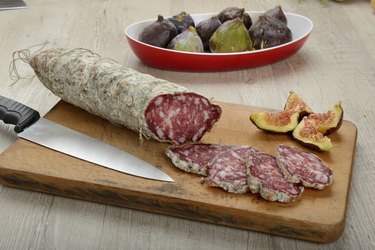
Dried salami are among the noblest of all cured sausages. And many of the best are distinguished by -- of all things -- a coating of mold. These are referred to as "salame secchi fiore," with secchi meaning dry and fiore referring to the sausage's signature "bloom" of mold. Among the most exacting of sausages to make, these should never be consigned to the top of a pizza. Instead, relish their complex flavors with simple accompaniments.
What You're Getting
Video of the Day
The outward appearance of the salami can be rather disconcerting, to novices. They're made in natural casings, which vary in size and shape, and the drying process gives them a wrinkled and unprepossessing form. The coating of white mold does little to mend that first impression, but it's the secret to the flavor. The sausages are ripened from the inside by beneficial bacteria and from the outside by the white mold, in much the same way that related molds give Brie its appearance and flavor. This natural fermentation gives the salami a distinctive tang, and the mold also helps dry the sausages to a point that keeps them food safe.
Video of the Day
How to Enjoy It
To fully appreciate the subtleties of a salame secchi fiore, it's best enjoyed in small bites with the casing left on, like Brie. Cut coin-sized pieces from small rounds or shave larger sausages paper-thin. A good, crusty baguette or ciabatta provides a fine accompaniment, lending a mild but fragrant backdrop for the sausage's complexity. To balance its richness, serve a small plate of tangy pickles -- French-style "cornichons," for example -- or fresh fruit as a palate cleanser. Fine cheese and good wine, two other fermented products with complex flavors, are also excellent choices to go with your salame.